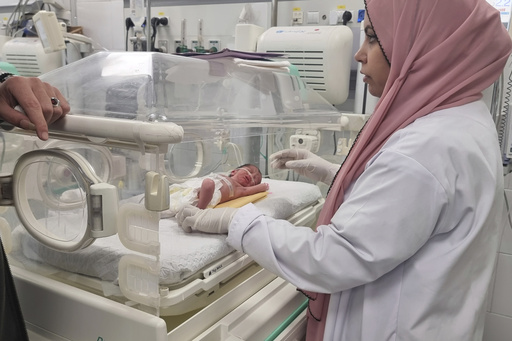RAFAH, Gaza Strip (AP) — Sabreen Jouda came into the world seconds after her mother left it.
Their home was hit by an Israeli airstrike shortly before midnight Saturday. Until that moment, the family was like so many other Palestinians trying to shelter from the war in Gaza’s southernmost city of Rafah.
Sabreen’s father was killed. Her 4-year-old sister was killed. Her mother was killed.
But emergency responders learned that her mother, Sabreen al-Sakani, was 30 weeks pregnant. In a rush at the Kuwaiti hospital where the bodies were taken, medical workers performed an emergency cesarean section.
Little Sabreen was near death herself, fighting to breathe. Her tiny body lay in the recovery position on a small piece of carpet as medical workers gently pumped air into her open mouth. A gloved hand tapped at her chest.
She survived.
On Sunday, in the hours after the airstrike, she whimpered and wriggled inside an incubator at the nearby Emirati hospital’s neonatal intensive care unit. She wore a diaper too big for her and her identity was scrawled in pen on a piece of tape around her chest: “The martyr Sabreen al-Sakani’s baby.”
“We can say there is some progress in her health condition, but the situation is still at risk,” said Dr. Mohammad Salameh, head of the unit. “This child should have been in the mother’s womb at this time, but she was deprived of this right.”
He described her as a premature orphan girl.
But she is not alone.
“Welcome to her. She is the daughter of my dear son. I will take care of her. She is my love, my soul. She is a memory of her father. I will take care of her,” said Ahalam al-Kurdi, her paternal grandmother. She clutched her chest and rocked with grief.
At least two-thirds of the more than 34,000 Palestinians killed in Gaza since this war began have been children and women, according to Gaza’s Health Ministry.
The other Israeli airstrike in Rafah overnight killed 17 children and two women from an extended family.
Not everyone is immediately recovered after such attacks.
“My son was also with them. My son became body parts and they have not found him yet. They do not recognize him,” said Mirvat al-Sakani, Sabreen’s maternal grandmother. “They have nothing to do with anything. Why are they targeting them? We don’t know why, how? We do not know.”
On Sunday, the survivors buried the dead. Children in bloodied wraps were placed in body bags and into the dusty ground as families wailed.
Little boys watched and tried to keep their footing at the edge of a grave.
___
Find more of AP’s coverage at https://apnews.com/hub/israel-hamas-war
This website uses cookies so that we can provide you with the best user experience possible. Cookie information is stored in your browser and performs functions such as recognising you when you return to our website and helping our team to understand which sections of the website you find most interesting and useful.
